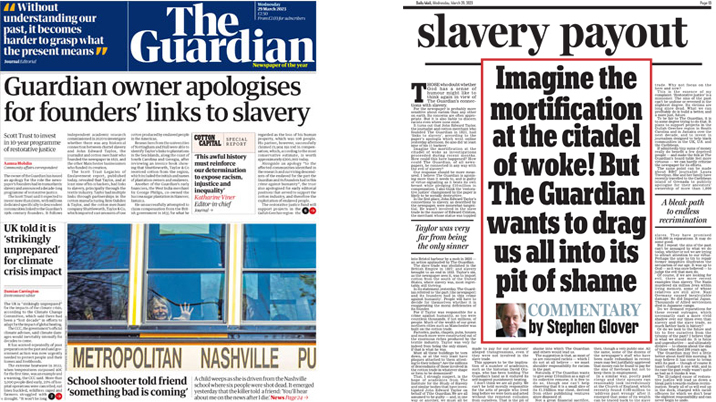
A tale of two newspapers – part 1: The Mail
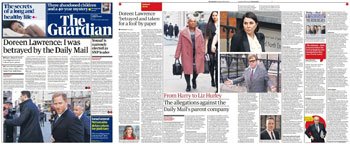
There is little love lost between the Mail and the Guardian, but rarely has the animosity between the two been as apparent as last week, when both titles made, as well as reported, the news. First there was the preliminary hearing of the privacy case being brought against Associated Newspapers by Prince Harry, Doreen Lawrence, Elton John and other celebrities. Then there was the Guardian apologising for its founders’ links to the slave trade and its plans to spend £10m in reparations. Both stories made the lead for the Guardian (on successive days), neither did for the Mail.
The Tuesday splash, headlined “Doreen Lawrence: I was betrayed by the Daily Mail”, was based on court documents released on the first of a four-day hearing at the High Court, and included the claim that the paper hired private investigators to hack her phone and obtain information about her son Stephen that might have disrupted the police investigation into his murder.

If this were true, it would be pretty damning for the Mail, which has made great capital out of its involvement in the case, most notably its much-lauded “Murderers” front page on which Paul Dacre published photographs of the suspects and dared them to sue. Now her lawyers are claiming that Baroness Lawrence “feels violated and like she has been taken for a fool”, and that, rather than campaigning because of a genuine desire to see justice for her son, she "now sees that the Daily Mail's true interests were about self-promotion and using her and her son's murder as a means to generate 'exclusive' headlines, sell newspapers, and to profit”.
The Guardian report, which includes high up the Mail’s dismissal of the claims against it as “preposterous smears”, continues on an inside spread, where there is a list of the other complaints against the paper.
The most notable feature of this hearing was, of course, that the Duke of Sussex flew in from America to attend. You don’t often see a member of the Royal Family in a court of law. Physically, rather than just represented by lawyers. So quite a big deal. Even if the royal in question lives in self-imposed exile and is, as the Mail put it, a serial litigator obsessed with the paper.
And he was not alone: Baroness Lawrence, Elton John and his husband David Furnish, and Sadie Frost also turned out in person for the hearing. Only Elizabeth Hurley and Simon Hughes of the seven plaintiffs were absent. The Mail has described the case as a “pre-planned and orchestrated” attempt to draw it into the phone hacking scandal. We shall likely see whether that were indeed so, but there can be little doubt that the heavyweight turnout for what would normally be seen as a technical hearing must have taken some organising. It is inconceivable that phone calls were not made, messages not exchanged.
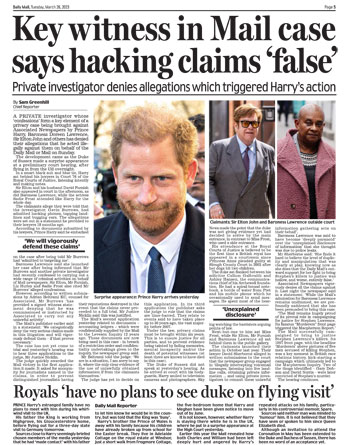
The Mail’s take on proceedings was, naturally, quite different from that of the Guardian. For a start, it wasn’t mentioned until page 5, and then under the headline “Key witness in Mail case says hacking claims ‘false’”. This is where it all becomes even more interesting. For the celebrities’ case appears to have been built on evidence from a statement by Gavin Burrows, a private investigator, to their lawyers 18 months ago. He is said to have admitted acting illegally – “hacking phones, tapping landlines and bugging cars” – on behalf of the Mail. But now he has produced another signed statement denying acting illegally on behalf of the Mail. It’s hardly surprising that the paper chose that, rather than Harry’s appearance or Baroness Lawrence’s statement, as the angle to go on. Nevertheless, it did report her accusations of duplicity and manipulation towards the end of the story, followed by an Associated statement saying that the Mail’s admiration for her was undimmed, but it was saddened that she had “been persuaded” to bring the case.
In this hearing, the Mail was seeking to have the whole case thrown out, arguing, among other things, that it was out of time and that it was, in part, based on material given in confidence to the Leveson inquiry that should therefore be regarded as inadmissible. It also applied for anonymity for its journalists “in order to prevent distinguished journalists having their reputations destroyed in the event that the case never proceeds to full trial”. The granting of this application was phrased as “the judge quickly awarded victory to the Mail…” Somehow the factoid that it had been made under the auspices of human rights legislation – which the Mail has repeatedly said should be repealed – did not make it into print.
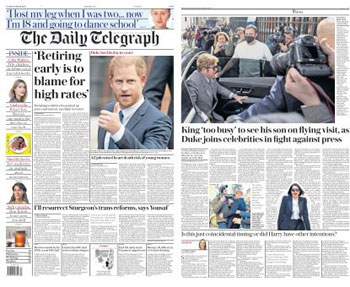
It is perhaps understandable that the Mail should defy court reporting convention under which the prosecution or claimants’ contentions are reported first, with the defence or counter-argument second. Especially if the allegations against it are, indeed, unfounded. But what of the rest of Fleet Street? The combination of the claims levelled against the Mail, the celebrity status of the people involved, and the court in which they are being heard should have catapulted the story towards the top of any news list. But there are those who accuse our national press of a culture of omerta, a reluctance to acknowledge, let alone confront, malpractice within the “club”, even by rivals. Was this in evidence here?
The Telegraph, Times and i had pictures of Harry on the front page, pointing to page leads inside. There the Times and i focused on the allegations, while the Telegraph fell in line with almost everyone else in angling the story on the fact that the King wouldn’t be seeing his son while he was in the country. Some mentioned the Lawrence or Elton John allegations, but coverage of the case itself was, in the main, perfunctory.
So much for day one. If Doreen Lawrence was a tasty starter, day two brought a seriously meaty main course in the form of Prince Harry’s witness statement. There were two central features:
- The Royal Family had known about phone hacking, he said, but didn’t tell him and did nothing about it – “never complain, never explain” – for fear of opening a can of worms. There was even, he said, a private agreement with the Murdoch papers not to “engage or even discuss” the possibility of bringing claims against them until the hacking litigation was over.
- His assertion that he had decided to sue Associated because “if the most influential newspaper company can evade justice…the whole country is doomed”. The statement continued: “I am bringing this claim because I love my country and I remain deeply concerned by the unchecked power, influence and criminality of Associated. The evidence I have seen shows that Associated's journalists are criminals with journalistic powers which should concern every single one of us. The British public deserve to know the full extent of this cover-up and I feel it is my duty to expose it.”
Wow! That’s some claim. Just a reminder, this is a statement by a royal prince in documents to the High Court, not just a wild allegation thrown out by some bloke in the pub. It may be that it shows, as the Mail attests, that he is obsessed. But it surely merits reporting.
The Telegraph, Guardian and Express managed to get all of those elements into their stories, with the Telegraph alone opting for the “Britain is doomed” line as the intro. The Times and i both angled their reports on the “can of worms”, but neither mentioned the alleged pact with News Group Newspapers or ran any of Harry’s explanation of why he was suing. As to the two titles whose owners have paid out millions in hacking damages: the Mirror managed five pars in a small single on the royals knowing about hacking; the Sun nothing.
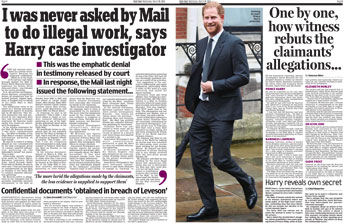
And the Mail? Not a word of those key elements from the Harry witness statement. Instead, it led its spread on its own statement, building on the Burrows recantation, with a panel on the side about his “point by point” rebuttals of the claims against Associated. It’s one thing to get your retaliation in first, but this took one-sided reporting to another level.
By day three of any court case, press interest tends to wane, and so it was with the High Court hearing – especially since the Duke of Sussex wasn’t there to pique interest. But at least everyone who bothered to report the case – including the Mail – agreed on the same angle: that it was going to be tricky for the claimants to prove their case if their key witness had retracted his original confessional statement.
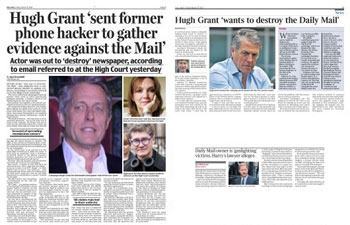
And finally, on day four, we saw the pendulum swing with the disclosure of an email in which it was alleged that Hugh Grant had tasked a self-confessed hacker with destroying the Daily Mail. Naturally, that made a page lead for the Mail, as it did for the Times, while the Telegraph ran a slim basement on a half-page. No one else was interested.
And the Guardian? How did the paper that had run the most detailed allegations against the Mail treat this evidence that it might be victim rather than villain? It ignored it and instead reported further claims from lawyer David Sherborne that Associated was “gaslighting” the Mail’s victims by covering up its journalists’ “illegal” behaviour.
So not one single national newspaper has presented to its readers a full and fair account of the proceedings in the High Court. The Times and Telegraph have come closest, but the rest have either been partisan, deliberately blind or uninterested. To be generous, maybe they thought “this is legal argument, if it goes to trial, we’ll do it properly then; if it doesn’t, then it will show we were right to play it down”. But when did our papers ever recoil from telling the same story over and over when it comes to, say, government promises and initiatives or love-rat footballers? Readers must have a constant feeling of déjà vu as the same subjects crop up time and again.
When you have such high-profile litigants taking on the country’s biggest news brand – actually accusing its journalists of being criminals – it is worthy of proper attention. If the case is thrown out at this stage as being without merit, then that tells us something about those people and their characters and motivations and we should have been kept up to speed on exactly what they were alleging, not just given snippets of what the most famous among them said.
If it is rejected on a technicality, then a sense of fair play and justice should allow examination, even without the backing of the law courts, of their complaints. The argument “It’s all navel-gazing, people aren’t interested” doesn’t wash. The simple test is to ask what the coverage would be like if the same seven people were making the same allegations against the BBC rather than the Daily Mail.
This widespread refusal to face challenges to our industry is troubling. But more so is the fact that it raises the question: if reporting of this case is so unreliable, what does it say about what we are served on everything else?
Part 2: The Guardian
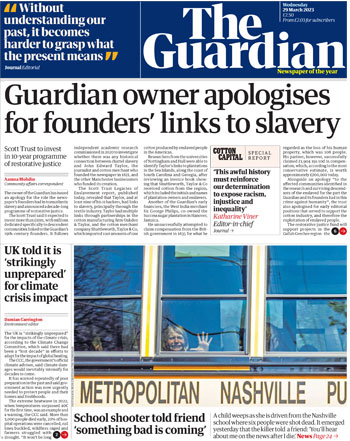
So much for the Mail’s court case, what of the Guardian and its slave shame? Last Wednesday, its lead story was “Guardian owners apologises for founders’ link to slavery”. In a self-examination exercise that would be almost inconceivable at Associated, the Scott Trust commissioned research into its own history by Hull and Nottingham university academics. (To be fair, Associated doesn’t need to conduct research; it is constantly being reminded of its past by those nasty Twitter trolls.) They discovered that John Edward Taylor, the Manchester Guardian’s founding editor, and nine of the paper’s 11 financial backers had links to slavery through the cotton trade. They also identified some of the slaves and their families.
The paper now intended to spend £10m in a “decade-long programme of restorative justice” that would involve investing in the communities where the slaves originated, beefing up editorial coverage of the Caribbean, Africa, South America and black communities in the UK, and expanding its bursary scheme for aspiring journalists from under-represented backgrounds.
Explaining the rationale behind the research, a panel on its inside spread said that it had been prompted by the Black Lives Matter protests after the death of George Floyd. “In the UK, the tearing down of Bristol's Edward Colston statue prompted many organisations to examine their own histories. The Guardian was at the forefront of reporting on this movement, but it could not do so without looking at itself.”
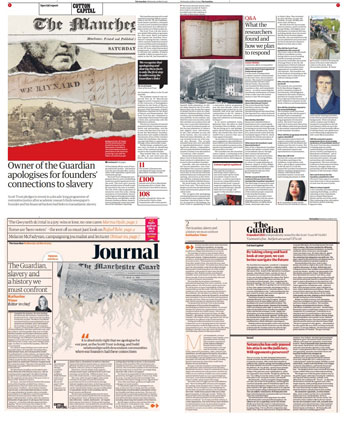
Editor Kath Viner went further in a piece on the cover of the paper’s Journal section, saying the research findings had left her “sick to her stomach”. The facts laid out in the Legacies for Enslavement report were horrifying; “different times” was no excuse for a crime against humanity.
There was a leader, too, and promises of further special reports and features with the launch of the “Cotton Capital” series.
This would, Viner wrote, explore the paper’s history and the broader impact of slavery on the country through essays, interactive journalism, podcasts and newsletters, starting with a special supplement with contributions from some of the world’s “best thinkers” the following Saturday.
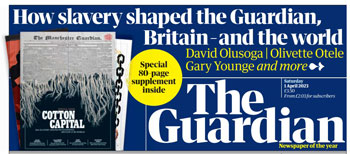
Quite a mea culpa. Or shallow virtue-signalling? Pointless breast-beating? It was certainly quite the sales pitch – and the big blue puff for that 80-page Saturday special “How slavery shaped the Guardian, Britain and the world” (is that really the right order of priorities?) was more than a little reminiscent of those for the Daily Mail’s glorious, magnificent, magical, superb royal supplements. Though, it being April 1, some of us might have been more enthused to see a reissue of the 1977 San Serriffe special.
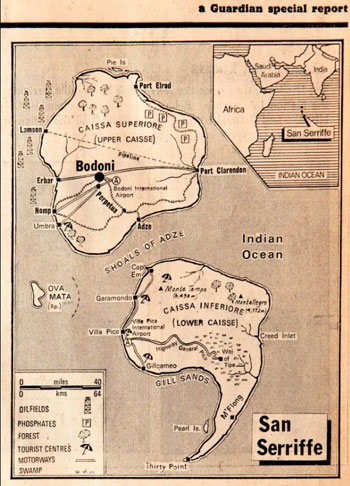
What did the rest of Fleet Street think of all this? Did it stir their consciences to look at themselves? Well, you knew the answer to that before I’d even finished typing the question. The Times reported the apology and £10m pledge on page 9, the Sun more briefly, but with the two key facts, on page 2 and the Telegraph on page 10, under a headline starting “Guardian digs up slavery links…”
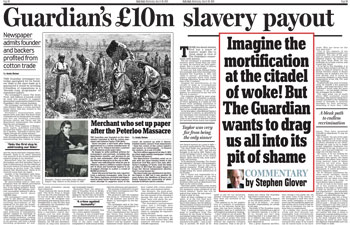
And that was it. Apart from the Daily Mail, which can never resist a bit of schadenfreude if it discomforts the paper that “did for the British press” in igniting the phone hacking scandal. It pushed the boat out with a spread (six pages on from the one that didn’t report Harry calling its journalists criminals) on “Guardian’s £10m slavery payout”. This included a straight news report, a background panel on John Edward Taylor and a comment piece by Stephen Glover, which started, “Those who doubt whether God has a sense of humour might like to think again” and concluded: “The Guardian may feel a little better about itself this morning. It may believe it has come to terms with its past – though of course it hasn’t changed it one whit…The ill-judged cause of restorative justice will lead us down a bleak path towards endless recrimination. Nearly all of us will end up in the dock, charged with racist offences for which we don't bear the slightest responsibility and can never begin to undo.”
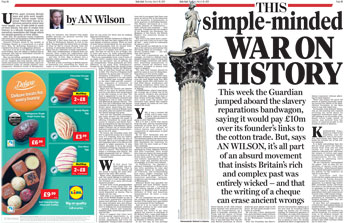
It was back again next day with another two-pager, this time an essay by A.N. Wilson railing against “This simple-minded war on history”. Meanwhile, Charles Moore was thinking in the Spectator that the Guardian had let itself off lightly by forking out a mere ten million quid, while the Sun’s Rod Liddle was stirred to attack “lefties” and defend the country’s honour, mocking the “achingly liberal right-on Guardian” with its “pygmy” circulation.
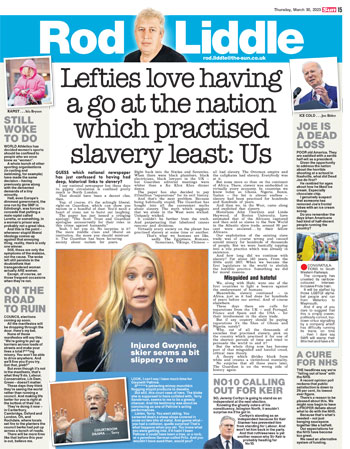
Less knee-jerk was the reaction in the Times where, after allowing a weekend for reflection, Jeremy White accused the Guardian of “an Orwellian rewriting of the past”. This was no standard “we can’t change the past, everyone was at it” response. Instead, it focused on specifics, pointing out how Lancashire and Manchester, whose economies were dependent on the cotton industry, had supported Abraham Lincoln’s fight against the slave-owning South, in spite of the financial hardship it caused them. Taylor should, White wrote, be admired for having founded a left-leaning paper that opposed slavery. The paper’s current staff owed him a huge debt, yet his reputation was being traduced by their disloyal and “deeply illiberal” revisionism. Will he have caused Viner to reassess? I doubt it.
So, there we have it, a tale of two newspapers and their interactions, from “nothing to see here” to “look how wonderful we are”, via “look at how awful the other one is” along the way. I just pity the poor reader, whose interests and concerns don’t seem to matter in any of this.
North London types

Having featured in a handful of papers last Friday, Hugh Grant was back in the Times on Saturday. This time in the company of Emilys Maitlis and Watson, Keir Starmer and Gary Lineker as members of the “liberal elite” who had, according to a weekend essay by Matthew Goodwin, “captured the conversation”. And not only the conversation, it seems. These Russell Group or Oxbridge educated types with their North London postcodes had captured the entire country – while at the same time being out of touch with it. It was the sort of piece that the likes of Andrew Neil and Fraser Nelson have been turning out for years, so hardly worthy of note, but for one thing. It was sufficiently off the wall to inspire this Twitter thread from Matt Chorley, whose mildly satirical political column occupies the previous page of the Saturday paper.
I mean it’s a daft argument, but bold to make it to the sort of “liberal elite” (or just sensible, intelligent) readers who know it’s a daft argument because they can see who is actually in power rather than just on the tellyhttps://t.co/GTCYgpSr4y
— Matt Chorley (@MattChorley) March 31, 2023
Shock: 25-year-old leans left

There’s out of touch and then there’s really out of touch. And almost a whiff of McCarthyism in the Sunday Telegraph last weekend. Its front page picture was of Mae Muller under a headline “UK’s Eurovision entrant bashes Boris and Britain”, with the caption: “The singer representing the UK at Eurovision is a Left-wing activist who hates Boris Johnson and said the former PM did not deserve an intensive care bed as he fought for life, The Sunday Telegraph can reveal.”
The Sunday Telegraph can reveal? That is shorthand for “look at this scandal we’ve uncovered”. When actually it means “we’ve looked through her Twitter timeline and found these nuggets from three years ago”. That sentence doesn’t explicitly say there’s something wrong with a leftwing activist being allowed to sing a song on our behalf, or that it is now forbidden for anyone to dislike Johnson, but my goodness, it’s there implicitly.
And just to make sure you get the message, there’s a full story on page 3, including a Conservative MP saying the BBC (for, of course, it is to blame for choosing Muller for the job) has shown a lack of common sense in projecting the author of these “vile leftwing slurs”. The MP in question is none other than Tory deputy chairman Lee Anderson, aka “30p Lee” thanks to his claim that families could cook meals from scratch for about 30p per day.
Anderson expands on his thoughts later in the story: “It's starting to look like vile Left-wing slurs are actually something the BBC requires from people it wants to promote. If they think by planting their own Left-wing entrant into Eurovision will see us re-enter the EU at some stage then they should think again. The days of 'making our mind up' are done.”
So what are these vile slurs? During the row over free school meals, she said, “I hate this country” (I’ve said that a lot in recent years, mostly in relation to infrastructure failings, so it’s a good job I can’t sing and wouldn’t dare to bare my midriff), and in April 2020, when Boris Johnson was in a stable condition in hospital with Covid, she questioned his right to an ICU bed.
In a series of tweets, she said: “Unpopular opinion, but I do not feel sorry for Boris Johnson. Yes, he is human, yes, he has kids, but so do 100s of other people who have actually died due to Tory policies. Taking up a bed in intensive care but you're not on a ventilator and in 'high spirits'? Nah mate.”
In another, she wrote: “The same nurses you praise in your speeches are the same nurses you chose to cut all their benefits, and CHEERED while doing it. The same nurses that can't even afford protective wear, and are LITERALLY dying because of YOU. Boris does not have my sympathy and NEVER will.”
Harsh, maybe. But now here’s a thing. Mae Muller is a 25-year-old woman. It may surprise the Sunday Telegraph and Mr Anderson to learn that many 25-year-old women – and many 25-year-old men – share her views of the Conservative party and Boris Johnson. Indeed, most of that age do, as do many musicians. If you exclude people with such opinions when you’re searching for someone to sing a song in Liverpool next month, you are going to be starved of choice.
(Never mind the whole question of the morality of looking into an artist’s background when judging their work – Gary Glitter, beyond the pale; Michael Jackson, maybe; Kevin Spacey, hmmm – does the requirement for moral rectitude diminish in inverse proportion to the genius levels of the artist? We’re back in Guardian slave trade territory and I don’t think anyone is suggesting that Mae Muller is a genius.)
So a manufactured story, but one that clearly appealed to the paper’s editor Allister Heath, since he chose to promote it on Twitter:
British Eurovision entrant is anti-Boris Johnson Left-wing activist https://t.co/jwCWEgBcIo
— Allister Heath (@AllisterHeath) April 2, 2023
We all know that Twitter is an echo-chamber. That we are preaching to the choir and all that. So Heath’s 84.7k followers would have seen that and been expected to tut in agreement at the very awfulness of Ms Muller’s words and the inappropriateness of such a woman representing the UK in a singing competition. (How come it’s not inappropriate for Marcus Rashford with his free school meals fetish to represent England at football? Ah, but maybe it is. After all, Mr Anderson MP vowed to boycott any sporting event at which players took the knee.)
But it seems Heath’s audience wasn’t as like-minded as one might expect. That tweet brought more than 4,500 replies. I scrolled through screensful (not them all, I’m afraid) and the common theme was “so what!” There were also hundreds of retweets. I looked at all of those that came with a comment. Not one endorsed the implied sentiment that there was something amiss.
Maybe Sunday Telegraph readers aren’t great Twitter users.
Potholes – not a priority

Sometimes, thank heavens, papers – and politicians – are more in touch with what people care about than they are given credit for. A couple of weeks ago, when the more serious papers were focused on the damning Casey report on the Metropolitan Police, the Sun’s splash was “Britain’s gone to pot”. It was about potholes. True local paper stuff, you might think.
Then this weekend we had joyous “local paper” treatment of the Prime Minister’s latest pledge with an absurd picture and, in the Times, the old chestnut “he’s looking into them” headline.
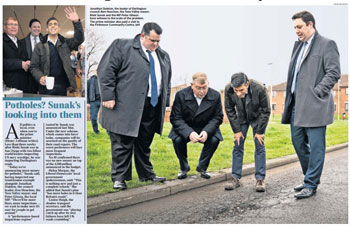
He needs to do more than that. Over the years, millions have been poured into filling potholes and millions more have been promised. In 2020, when Chancellor, Rishi Sunak pledged £2.5billion to improve roads and fill 50 million holes (4,000 of them in Blackburn, Lancashire? Enough to fill the Albert Hall?) Now he’s promising another £200m to add to a £500m “Potholes Fund”. So many big numbers.
You’ll find even more – and the scale of the blight – with a quick google of “potholes” with a “news” filter: Exeter, Burnley, Staffordshire, Bedfordshire, Oxford, Dursby, Peterborough, York, Telford, Chorley… and then there’s the bonus delight of Brightlingsea window cleaner Andy Conroy and his Playmobil toys “playing” in the pools.
Drive along any country road and you’ll find a patchwork quilt of tarmac that’s still dotted with holes. Some, but not all, of these will be circled with paint that means someone’s called a hotline and someone else has come out to look and make a judgment on which hazard is big enough to warrant repairing and which can be left to mature a little longer. Why not do the lot? You must be joking.
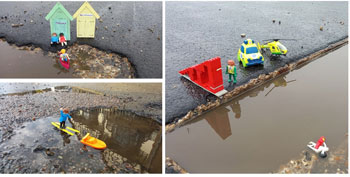
A parish councillor friend tells of a meeting at which a representative from the county council came to discuss matters of great moment: education, police services, local development plans and the like. And all anyone wanted to ask was, “When are you going to do something about the potholes?” His candid response? “We’ll never beat them. You’re just going to have to learn to live with them.”
Why? Because spending lots of money on fixing the roads, on properly repairing them rather than patching up, is wrong or unaffordable in a cost-of-living crisis? Because there are other calls on the public purse? Or because potholes sound like a joke that can’t possibly really matter to people in the grand scheme of things?
Well, I can tell you that they do. And I would bet my mortgage that given a choice between “stopping the boats” and “filling the potholes”, the mythical “British public” for whom our newspapers and politicians presume to speak would pick the latter every time.
Childcare – becoming a priority
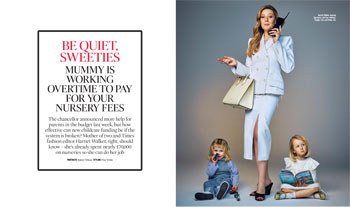
Another thing that matters to people is the cost of childcare. It is phenomenal. The average cost of a nursery place is £14,000 a year. The average cost of a mortgage is £9,500 a year.
Ok, that’s not a fair comparison; averages can be deceptive. Those mortgages are being paid by people of all ages and incomes; people who took out their loans decades ago and have only a little left outstanding and others who bought their homes more recently and are shouldering huge debts. The “average” mortgage is probably as reliable a figure as the “average” house price that pitches studio flats in rundown areas against multimillion-pound former embassies in central London.
On the other hand, the nursery fees are a reflection of the true charges that parents have to pay. And it’s terrifying. Young couples – many already saddled with thousands of pounds of debt from university – are seeing one salary almost entirely swallowed up on childcare costs, accepting this as the inevitable price of doing the best by their children while laying the foundations of their careers for the years to come. These are our doctors, teachers, midwives, engineers, solicitors, judges, journalists of the future – and they’re struggling.
We don’t want to lose these people, so Jeremy Hunt announced an expansion of “free” childcare in his Budget last month. It was all a part of enticing people into the workplace and it got a lot of positive publicity. Except, as is often the case with Budget announcements (from whichever party), the numbers didn’t add up quite the way the public was led to believe, and much of the benefit would not come into effect until after an election – by which time there is a very real chance that it will be Rachel Reeves, rather than Mr Hunt, who will have to pick up the bill.
In this instance the sleight of hand came in the announcement of 15 hours per week of “free” care. Which you might think means 780 hours a year, there being 52 weeks in the year. But, according to a piece in the Times Magazine by fashion editor Harriet Walker, it applies only to term time, so is actually the equivalent of 11 hours a week across the year. There is also the fact that these “free” hours will cost nurseries money, since the government doesn’t pay the full hourly rate. As one nursery owner told Walker: “There's nothing free about it. It costs us £9 per hour per child entitled to 15 or 30 hours but we get around £4 [from the government].”
We are, of course, talking about relatively well-heeled people. Not the families who could never dream of affording to send their toddlers to over-subscribed nurseries that charge a fortune in non-returnable deposits just for a place on a waiting list. As is often the case, the Times woke up to this issue and addressed it in depth because it touched on someone with clout in the building. (The ultimate example of this phenomenon being Paul Dacre’s sudden interest in justice for black teenagers when the victim happened to be the son of a man who plastered his house.) And it did so so well because Harriet Walker is a professional writer with an ability to tell her own story. This partly explains the disproportionate focus on middle-class problems. Working-class problems – the ones faced by thousands, if not millions, of families across the country – tend to be tackled not with glossy personalised features, but in “white saviour” type reportage where someone sweeps in, interviews a couple of people and returns to the office to pontificate from a distance.
There is plenty of hand-wringing and sympathy – but little empathy. Until, as I say, the problem moves up through the social hierarchy. As evinced by this jaw-dropping paragraph in Walker’s feature: "Five years ago, this stuff mostly had an impact on low-income households," says Joeli Brearley, founder of the parents' rights group Pregnant Then Screwed. "But things have now got so bad that middle-income families are being seriously affected. Conservative voters are affected. The government can't ignore it any longer."
Excuse me? These problems have existed for at least five years, but only now – because they are hurting richer Tory voters and not just the poor – does something have to be done about them? I didn’t know whether to be appalled or to applaud that someone should say such a thing out loud.
But the point here is that with almost every Budget, it takes a few days for the reality behind the headline measures to filter through. And by then they have moved off the front pages, through the inside news pages, and back to the finance and features sections with their much smaller readerships. Aside from the ghastly quote above and the obvious self-interest (suitably interspersed with “I know I’m much better placed than millions of others” acknowledgements), Walker’s piece was a valuable bit of journalism. It raised points that should have been considered by news and financial journalists years, months and weeks before.
It was not unique in that. There’s gold in those little-read sections; the family money supplements mine it week after week. The challenge is how to get news editors to recognise it, polish it up, and bring it to the attention of a wider audience.
Updates on Lineker and Braverman
A couple of quick updates. First Gary Lineker.

Just under two years ago, HMRC came after Lineker for £5m, saying he was avoiding tax by the way he was paid for his BBC work. The story, as you can imagine, was given some prominence: the page 3 lead for the Telegraph, Express and Times, page 5 for the Mail. Last week, hard on the heels of the Twitter controversy that saw him briefly suspended from Match of the Day, he won his case. Were those papers so enthusiastic about reporting this second victory? Er, hardly.
The Telegraph was consistent, with a page 3 lead, the Times also gave it a page lead – on 15 – while the Express relegated it to a few sentences on 11 and the Mail to the foot of page 7. Sorry about the “relegated” there. Footballing analogies seem to be de rigueur when it comes to Mr L.
Even in the i, which recognised both the public appeal of the story and its wider ramifications.

Next, Suella Braverman.

Remember last time we had a look at the client journalists who accompanied the Home Secretary to Rwanda and the obliging headlines they produced. They included the assertion that the European Court of Human Rights was on the brink of caving in to lift its objections to the deportation flights.
So this Sunday Telegraph splash left me a little perplexed. Why, given what we were told the previous week, should it be necessary for her to overrule its judges? Perhaps the words “if Britain cannot negotiate an exemption” might be the clue. Not such a done deal then.
And then there were all those “Rwanda flights by the summer” splashes, courtesy of briefings to those favoured journalists in Kigali. Could we believe those? Perhaps not. Asked by Sky’s Sophy Ridge last Sunday to confirm that this was the case, Braverman declined to do so, saying, “We are making steady progress. I’m not going to give a deadline when flights will take off.”
So, to return to the footballing theme, may I suggest that the final score in the Rwanda game was Government PR team 2…Reliable Journalism 0.
Miscellany
And some more tinies:

Paul O’Grady was one of those people whose career takes them from the fringes to the heart of the mainstream, so that the very people who most hated him as Lily Savage came be those who most loved him as a Radio 2 presenter. This in turn meant that press coverage of his death was both prominent and warm, including the splash for the Sun and Mirror.
Only two front pages (other than the FT) did not feature him that day. Both had anti-trans stories as splashes. Coincidence?
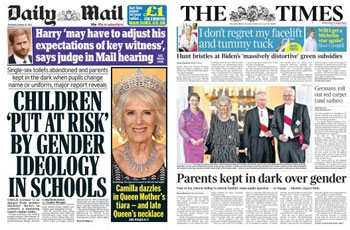
I really do find this gender obsession depressing. There are legitimate issues to be considered, but press coverage is so lacking in compassion and concern for the vulnerability of trans people that it sometimes feels as though we’re back in the witch-hunting days of the 1640s. The Times was back with yet another go on the front page yesterday, having commissioned an article by the chair of the Equality and Human Rights Commission in which she calls for a legal definition of “sex” and contemplates whether it should mean “biological sex”.
Now, according to the front-page story, the Prime Minister is minded to change the law so that only people born female can use single-sex facilities such as changing rooms. If this is the case, it is amazingly important – and, to me, shocking. It’s one thing to protect women and their “safe spaces” from the vanishingly small number of predatory men who self-identify as women in order to abuse or assault; but to enact laws so that someone who has undergone an inevitably traumatic series of operations physically to change gender – and got a certificate to prove it – cannot be treated in a women’s hospital ward strikes me as regressive and cruel.
But what do I know? Maybe I’ve got the wrong end of the stick. I do hope so.
Still in obituary corner, Nigel Lawson obviously deserved his front-page presence on Tuesday. I thought the Telegraph was a little OTT with a splash and a Charles Moore appreciation, but Lawson was one of their own and he was a big political figure in the 80s, so maybe it was right for the audience.
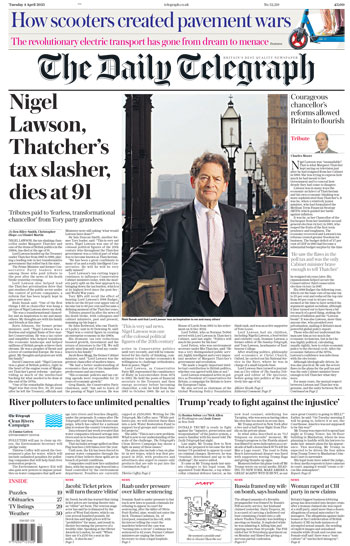
Where I did bridle was at the Express. My generation of women have lived their whole lives being defined by some man: so-and-so’s daughter, wife, secretary. It’s a habit that some still find hard to break. But whoever would have imagined that in this day and age, a successful man would be defined by the woman he once worked for. They could at least have put his name first.
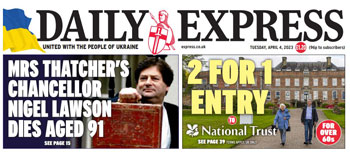
And finally, a bit of nit-picking at the i.
I should declare a personal interest here. I’m supposed to be going to France in a few days, but the chances of that seem remote since I returned home from a Mother’s Day lunch to find the dog had eaten my passport. Naturally, I am over-eager for news of how the system is coping with the backlog and the strike. But I think the i missed the mark here. UK summer holidays aren’t being hit by the delays. You don’t need a passport to take a break here, as Jacob Rees-Mogg has been busily urging us all to do. Two superfluous letters that completely change the meaning of a splash headline – and make it wrong.
Ah well.
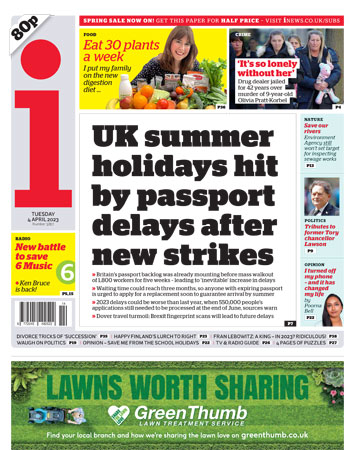
Front page of the fortnight
I liked the Mirror on Kwarteng, but that was really on the coat-tails of the Led by Donkeys group and Hancock was the one most people were enraged by.

The Express did a good job on the conviction of Thomas Cashman for the murder of Olivia Pratt Korbel.

The Times and the i had, I thought, the best Trump fronts yesterday, both choosing a picture of him behind a policeman that was far more powerful than the one of him sitting at the table in court that others inexplicably preferred. (The Telegraph was clearly having an off day. It’s “Trump under arrest” splash headline was just daft. Things have moved on since he was arrested. “In court”, “on trial”, “in the dock” – even though he visibly wasn’t – would all have been better.)
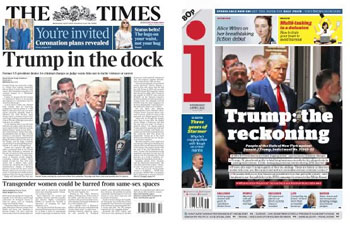
But for me, the best front page of the fortnight came from the online-only Independent, which of course doesn’t have a conventional front page other the ones created for distribution to newspaper reviewers. This story about one of the small boat “migrants” and its four follow-ups were excellent. Now we learn that Nepalese and Indian security guards who not only protected our embassy staff in Afghanistan, but were actually flown out by our own rescue missions as the Taliban took over the country, have been rounded up, detained, and told that they are to be deported. That story doesn’t make a single front page, while this morning, the Express leads on Sunak saying that housing asylum-seekers on a barge is both “fair” and will save us money. Makes you proud to be British.

PS: Late contenders for this slot come this morning from the Guardian and The Times, which both appear to have stonking exclusives. But deadlines being what they are, we’ll have to wait until next time to see if they live up to their promise:

Liz Gerard’s Notebook is a fortnightly column published in the InPubWeekly newsletter. To be added to the mailing list, enter your email address here.












